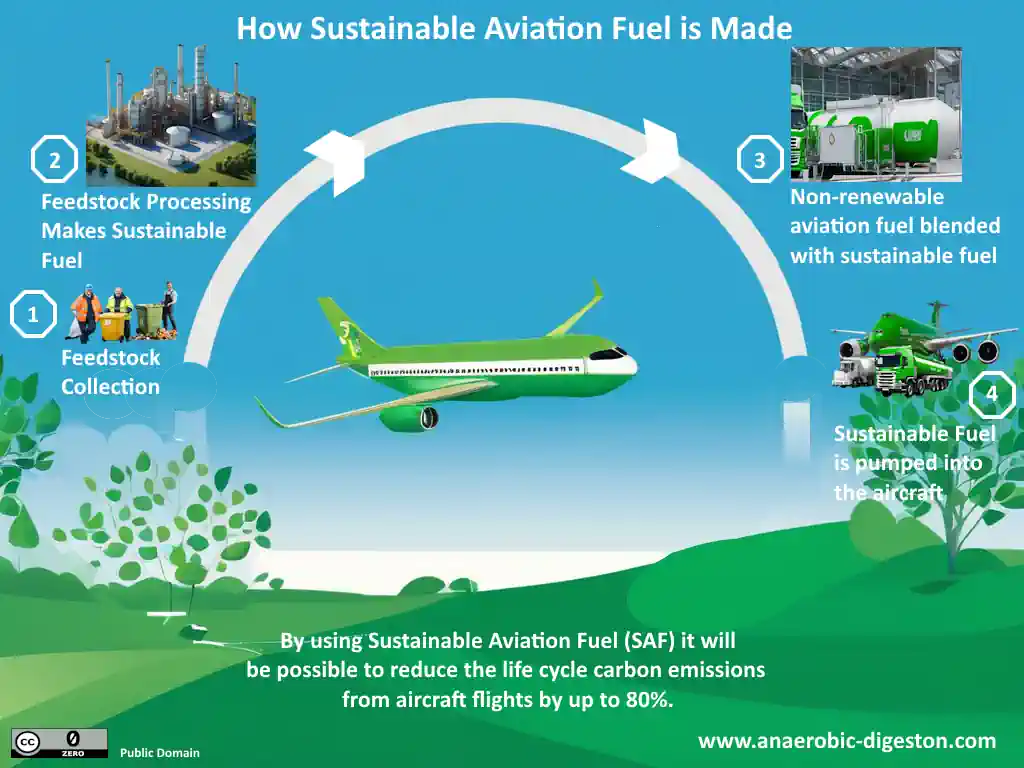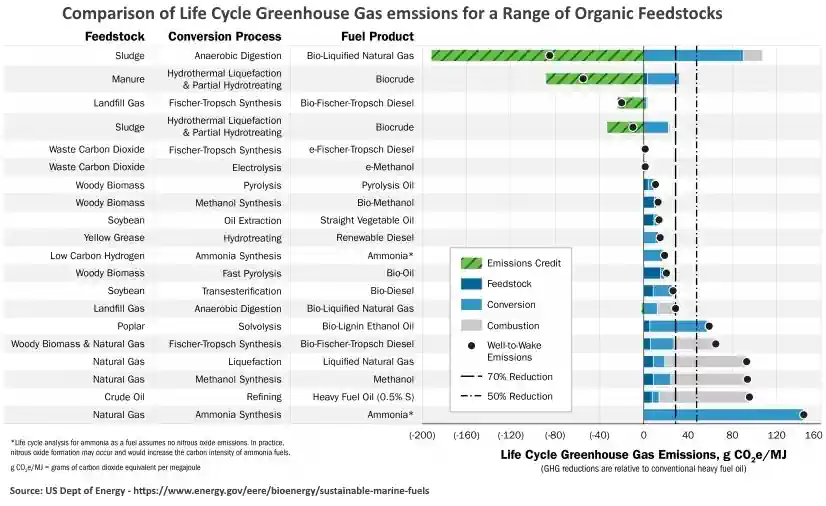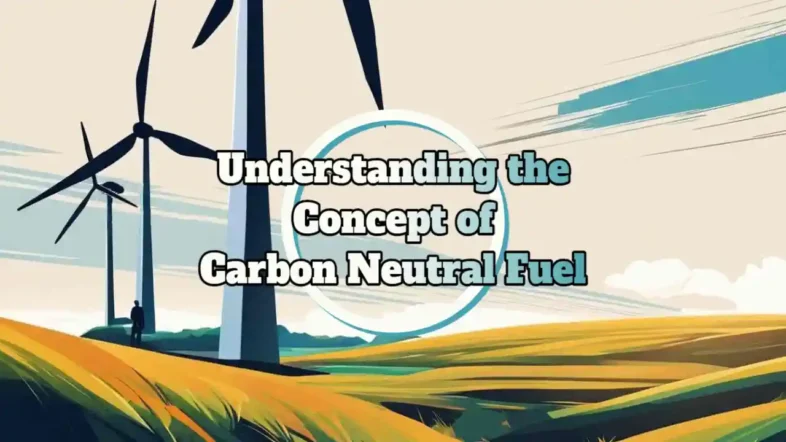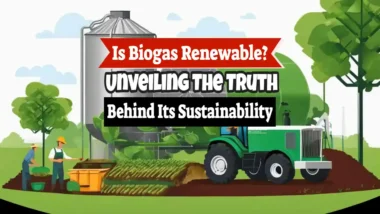Carbon neutral fuel: Maybe it sounds good, but what does it really mean?
This is an important question because we will all be becoming much more familiar with the idea over the next few years, and if all goes well, there will be a lot of it around.
Carbon-neutral fuel is a type of energy that does not add new greenhouse gases to the atmosphere. It means that when we use this fuel, it balances out because plants or other methods take in as much carbon dioxide as is released.
Our planet faces big challenges with climate change, and carbon-neutral fuels are one way to help fix this problem without using up all our resources and there is a central role in this for anaerobic digestion and biogas.
[boomdevs_toc]
Introduction to carbon neutral fuel
Producing carbon-neutral fuels involves making synthetic hydrocarbons, tapping into renewable sources like the sun and wind, or even using nuclear energy. Sometimes companies recycle carbon from other places too.
Using these fuels can slow down climate change, create cleaner air for us to breathe, lead to new technologies being made, and create more jobs for people. It also means countries can make their own energy instead of relying on others.
We see carbon-neutral fuels in many areas; aeroplanes may soon fly using them, and biomethane trucks already do!
Factories can run on them too, and so can farms. They even keep our homes warm or cool depending on the weather because in the UK our electricity is already 40% renewable solar and wind generated.
Big companies like the Shell oil company, Porsche the car maker, and Neste which makes renewable products, are all working hard on creating clean carbon neutral fuel technologies. This dedication shows how important they believe it is for our future.
As more people start using these eco-friendly alternatives to normal fossil fuels like coal or oil, it will really help our world reach its goal of no longer adding harmful gases into the air – an idea known as net-zero emissions.
To get to a point where the world adopts carbon neutral fuel, will need:
- everyone working together;
- businesses joining hands with each other;
- technology becoming smarter every day;
- governments supporting positive changes through rules about pollution control.
Switching over won't be easy, though; it costs a lot of money and requires changing a lot about how we currently get our energy.
But if we want things to get better for Earth's environment now and in the long run, thinking about all this stuff matters! Let's take a closer look at what's happening with carbon-neutral fuel today.
Carbon Neutral Fuel – Key Takeaways
- Carbon neutral fuel balances the CO2 it emits with what's absorbed, aiming for zero net carbon emissions. It uses renewable energy like solar and wind power.
- Companies like Shell, Porsche, and Neste are investing in carbon-neutral fuels to create sustainable energy options and reduce their environmental impact.
- The use of carbon-neutral fuel is spreading across various industries, including transport with electric planes and lorries, and agriculture. This helps cut down on greenhouse gases.

What is Carbon-Neutral Fuel?
Carbon-neutral fuel refers to energy sources or fuels that have been produced in such a way that their net carbon emissions are zero. The goal is to reduce the carbon footprint and mitigate climate change.
Definition
Carbon neutral fuel is a type of energy that does not add extra greenhouse gases to our atmosphere. It balances the carbon dioxide it emits when used with what's already in the air.
This means that for every tonne of CO2 released, an equivalent amount must be absorbed or offset somehow. The goal is simple: reduce our overall carbon footprint and help protect the environment.
The idea behind this fuel is to make everyday activities more eco-friendly by not increasing Earth's atmospheric total carbon levels. Using renewable energy sources helps create sustainable fuel without depleting resources or harming the climate.
Carbon neutral fuels are key to moving toward cleaner, greener living as they strive for environmental sustainability and reduced emissions.
Now let's look at how these fuels are produced and where they come from.
The goal of reducing “carbon footprint”
When aiming to reduce our carbon footprint, we are striving to lower the amount of greenhouse gases emitted into our atmosphere. This goal is crucial in combatting climate change by lessening the impact of human activities on the environment.
Switching to carbon-neutral fuel helps achieve this by effectively balancing out the release of carbon dioxide with its absorption or offsetting, thus reducing overall emissions and working towards a more sustainable future for all.
Using renewable energy sources and developing cleaner technologies contributes significantly to minimising greenhouse gas emissions, making it easier for both individuals and industries to transition towards a greener and more eco-friendly approach while positively impacting our planet's health.
Production and Sources of Carbon-Neutral Fuel
Carbon neutral fuel is produced using synthetic hydrocarbons, renewable wastes such as used cooking fat, and nuclear energy sources.
However, the best renewable fuel maker for efficiency in the conversion of the recycled carbon sources is the anaerobic digestion process.
Nevertheless, all these methods aim to reduce the overall carbon footprint of the fuel production process to net zero.

Use of synthetic hydrocarbons
Synthetic hydrocarbons are utilised in the production of carbon-neutral fuel, offering an alternative to traditional fossil fuels. These hydrocarbons, derived from renewable energy sources such as biomass or captured carbon emissions, play a crucial role in reducing greenhouse gas emissions.
Their use contributes to balancing the carbon dioxide released into the atmosphere during combustion, aligning to achieve net-zero emissions. Synthetic hydrocarbons present a promising method for transitioning towards cleaner and sustainable energy solutions, addressing environmental concerns while meeting energy demands.
This innovation marks a significant step towards creating a more eco-friendly and low-carbon future.
Hydrocarbons produced synthetically enable the development of environmentally friendly fuel options that significantly reduce overall carbon footprint. The integration of synthetic hydrocarbons into fuel production showcases advancements in clean technology and reinforces efforts to combat climate change by promoting eco-friendly alternatives over traditional fossil fuels.
An example of this form of fuel is explained in the next section:

Sustainable Aviation Fuel (SAF): A New Horizon for Eco-friendly Air Travel
As the quest for reducing the environmental footprint of aviation intensifies, Sustainable Aviation Fuel (SAF) emerges as a key innovation steering the industry towards a more sustainable future. This section explores the essence of SAF, its origins, upcoming production initiatives in the UK, its environmental advantages, and the timeline for its integration into mainstream aviation operations.
What is Sustainable Aviation Fuel?
Sustainable Aviation Fuel (SAF) is an eco-friendly biofuel designed to power aircraft with a significantly lower environmental impact compared to traditional jet fuels derived from crude oil.
SAF is produced from a diverse array of sustainable resources, including, but not limited to, waste oils of biological origin, agricultural by-products, captured non-fossil CO2, and algae. This shift towards sustainable resources not only diminishes the dependency on fossil fuels but also notably cuts down the aviation sector's ecological footprint.
Upcoming Production Sites in the UK
The United Kingdom is at the forefront of the SAF movement, with several projects in the pipeline to establish SAF manufacturing facilities. A prime example is a planned facility in Immingham, located on the Humber Estuary, which is anticipated to be among the UK's inaugural SAF production sites.
The aim is to transform household and commercial waste into millions of liters of SAF, underscoring the UK's ambition to be a trailblazer in sustainable aviation technology.
Why SAF is Considered Low Carbon
SAF's claim to a low-carbon footprint is largely attributed to its sustainable production methodology and the lifecycle of its biomass feedstocks. The cultivation of these feedstocks inherently captures carbon, which offsets a considerable portion of the emissions when the fuel is combusted.
This cyclical process significantly curtails the net carbon emissions from aviation fuel, positioning SAF as a pivotal element in the industry's strategy to combat climate change and achieve carbon neutrality.
The Path to Adoption for Scheduled Aircraft Flights
The adoption of SAF for powering routine aircraft flights is gradually transitioning from a vision to reality. Governmental and international organizations are actively supporting the industry's efforts to improve SAF production capabilities and its economic viability.
Some airlines have already started to blend SAF with conventional jet fuel for commercial operations, though in limited quantities due to production and cost constraints.
The use of SAF on regular aircraft flights will gain momentum in the foreseeable future, driven by:
- advances in technology,
- scaling of production, and
- improved cost-effectiveness.
According to predictions, SAF could facilitate a sizable portion of global air travel by the end of this decade, ushering in a new era for sustainable aviation.
In essence, sustainable aviation fuel is poised to be a cornerstone in aviation's transition to sustainability, offering a practical solution to mitigate the sector's environmental impact. With increasing production capabilities in the UK and globally, SAF is set to significantly contribute to the advent of eco-conscious air travel, ensuring a greener future for the aviation industry.
Renewable and nuclear energy sources
Renewable and nuclear energy sources are crucial in the production of carbon-neutral fuels. These sustainable sources include solar, wind, hydroelectric power, and nuclear energy. Solar power harnesses sunlight to produce electricity, whilst wind turbines convert kinetic energy from the wind into electrical power.
Hydroelectric power utilises flowing or falling water to generate electricity. Nuclear energy is generated from controlled nuclear reactions that release heat used to produce steam and ultimately electricity.
These renewable and nuclear energy sources play a pivotal role in creating carbon-neutral fuel by reducing reliance on fossil fuels and mitigating greenhouse gas emissions.
Nuclear energy is essential for producing carbon-neutral fuel as it does not emit greenhouse gases during operation, making it a low-carbon emission source. Renewable energy sources such as solar and wind contribute significantly towards reducing CO2 emissions compared to traditional fossil fuels.

Recycled carbon sources
Transitioning from renewable and nuclear energy sources, carbon-neutral fuel can also be derived from recycled carbon sources. This involves capturing carbon emissions from industrial processes or directly from the atmosphere and converting them into usable fuel.
By utilising waste gases and other forms of recycled carbon, such as biomass or organic waste, these sources can play a crucial role in reducing overall greenhouse gas emissions. Furthermore, this approach provides an innovative solution to repurpose existing carbon rather than releasing it into the atmosphere.
The process of using recycled carbon sources to produce fuel not only mitigates the environmental impact but also contributes towards sustainable resource management. Harnessing these unconventional sources aligns with the goal of achieving net-zero emissions by maximising the use of existing resources while minimising new emissions.
Benefits of Carbon-Neutral Fuel
Carbon-neutral fuel offers a range of benefits, such as mitigating climate change, improving air quality, and fostering technological innovation. The transition to carbon-neutral fuel also promotes energy security, environmental conservation, and job creation.

1. Climate change mitigation
Carbon-neutral fuel plays a vital role in mitigating climate change by reducing greenhouse gas emissions, particularly carbon dioxide. It helps limit the amount of harmful gases released into the atmosphere, thereby slowing down global warming and its adverse effects on the environment.
This eco-friendly fuel contributes to efforts aimed at achieving net-zero emissions and addressing the urgent need for sustainable energy sources. Embracing carbon neutral fuel can lead to significant progress in combating climate change and promoting a cleaner, greener future for generations to come.
Utilising carbon neutral fuel actively supports climate change mitigation by cutting down on overall carbon emissions across various industries and applications. This alternative energy source provides an effective means of reducing our environmental impact while fostering technological innovation and sustainability practices worldwide.
2. Improved air quality
Carbon-neutral fuel is designed to burn cleanly. This contributes to improved air quality by reducing harmful emissions that contribute to air pollution. By using renewable energy sources and emitting minimal greenhouse gases, carbon-neutral fuels help decrease the levels of pollutants in the atmosphere, thus promoting cleaner and healthier air for all.
This is particularly important as poor air quality can lead to a range of health issues, including respiratory problems and cardiovascular diseases. With companies like Shell and Neste embracing carbon-neutral fuel, there's a growing opportunity for widespread adoption within industries such as transportation, energy production, and agriculture – further enhancing efforts to improve air quality while advancing towards sustainable practices.
3. Technological innovation and job creation
The shift towards carbon-neutral fuel is driving technological innovation and creating job opportunities. Advancements in renewable energy sources, such as solar and wind power, are leading to new technologies for producing carbon-neutral fuel.
This innovation not only reduces environmental impact but also opens up employment prospects in the sustainable energy sector. Companies are investing in research and development to improve production processes, thus creating a demand for skilled workers in this rapidly growing industry.
Moreover, the transition towards carbon-neutral fuel will lead to job creation across various sectors, including engineering, manufacturing, transportation infrastructure, and research and development.
4. Energy security and independence
Advancements in technology and job creation within the carbon-neutral fuel industry contribute to enhancing energy security and independence. With a focus on eco-friendly fuel, nations can reduce their reliance on imported oil and gas, fostering greater energy self-sufficiency.
Furthermore, by embracing low-carbon fuels like biofuels and synthetic hydrocarbons, countries can bolster their energy security through the diversification of energy sources, reducing their vulnerability to supply disruptions or price fluctuations.
On top of all that, this shift towards carbon-neutral fuel also promotes cleaner air and mitigates climate change impacts by curbing greenhouse gas emissions. By prioritising renewable energy sources for fuel production, our society moves closer to achieving net-zero emissions and environmental sustainability.

5. Environmental conservation
Transitioning from energy security and independence to environmental conservation, it's essential to highlight that carbon neutral fuel plays a pivotal role in preserving our environment.
The use of carbon-neutral fuel promotes reforestation initiatives through carbon offsetting schemes. Companies that have no way to reduce their non-renewable energy use, due to the nature of their business, contribute to offsetting schemes. These are projects such as replanting forests, minimising the adverse effects of global warming.
Applications and Industries Soon to be Utilising Carbon-Neutral Fuel
From transportation to industrial processes, carbon neutral fuel is being utilised across a range of industries to reduce emissions and environmental impact. It has applications in planes, electric lorries, ships, energy production, agriculture, and heating and cooling systems.
Biomethane is the first of these fuels (in 2024) to be adopted for vehicle fleets because standard truck engines need little more than re-tuning to use liquified biomethane fuel. Biomethane is actually better for the environment because most experts agree that it is carbon-negative. In other words, by using it, the operator is putting back more carbon dioxide than if they had not used it!
Transportation (planes, electric lorries, ships)
Companies are actively exploring ways to develop and implement carbon neutral fuel for aircraft, electric trucks, and maritime vessels. By embracing this eco-friendly technology, they contribute towards mitigating climate change by reducing harmful emissions from their transportation activities.
Planes, electric lorries, and ships have immense potential to benefit from carbon neutral fuel as it offers a promising solution to combat climate change while ensuring efficient and sustainable transportation options.
Shipping may well also turn to SAF as their transition fuel and later may well move to use hydrogen.
Will industrial processes move to low-carbon fuels?
Industries are not yet utilising carbon-neutral fuel to power their operations because they can already use electricity of which 39% was made from renewable energy sources in the UK during 2023.
The most urgent need for carbon neutral fuel is to provide enough fuel to meet the demand from the transport sector because there is no alternative renewable fuel available for transport.
When carbon neutral fuels become more readily available, they may start to be used in industrial processes, reducing their environmental impact and contributing to a more sustainable future.
The production of carbon neutral fuel aligns with the need for low-cost and cleaner energy sources in manufacturing processes.
Agriculture
Carbon-neutral fuel has the potential to revolutionise agriculture by offering eco-friendly alternative fuels for farming operations. By using carbon neutral fuel, of which the front runner is biomethane from anaerobic digestion plants, in agricultural machinery and vehicles, such as tractors and harvesters, farms can significantly reduce their carbon footprint while contributing to cleaner air quality.
Additionally, utilising renewable energy sources in agricultural processes aligns with the growing global emphasis on sustainability in food production.
The shift towards carbon neutral fuel in agriculture opens up opportunities for more environmentally conscious farming practices and contributes to mitigating climate change impacts.
This adoption not only benefits the environment but also promotes sustainable food production methods, ensuring a healthier future for both the planet and its inhabitants.
Heating and cooling systems
Heating and cooling systems will continue to move toward electricity as their energy source now that, in the UK, almost 40% is produced from renewable sources. However, in the future, carbon neutral fuels will probably play a significant role.
This approach aims to reduce carbon footprints by transitioning away from traditional fossil fuel-based heating and cooling methods.
By embracing low-carbon fuels in heating and cooling systems, it becomes possible to improve air quality and reduce environmental impact within homes, offices, and industrial facilities.
Companies Embracing Carbon-Neutral Fuel
Shell, Porsche, and Neste are just a few of the companies leading the way in embracing carbon-neutral fuel, showcasing their commitment to environmental sustainability and innovation.
1. Shell
Shell has made significant strides in embracing carbon neutral fuel. They are investing heavily in renewable and low-carbon energy solutions to achieve their goal of becoming a net-zero emissions company by 2050.
Their focus on biofuels, electric vehicle charging infrastructure, and hydrogen development demonstrates their commitment to reducing the environmental impact of transportation and energy production.
Shell's initiatives align with the global push towards sustainability and offer promising opportunities for advancements in technology and partnership collaborations within the industry.
The concept of carbon neutral fuel is not just a distant aspiration but an actionable plan that companies like Shell are actively pursuing. By prioritising renewable energy sources and innovative technologies, they aim to revolutionise the way we produce and use fuel while contributing to climate change mitigation on a substantial scale.
2. Porsche
Porsche, a renowned automobile manufacturer, has made significant strides in embracing carbon neutral fuel. The company is investing in research and development to produce sustainable fuels for its high-performance cars.
By leveraging synthetic hydrocarbons and renewable energy sources, Porsche aims to reduce its carbon footprint and lead the way in environmentally friendly transportation solutions.
This initiative aligns with the global movement towards net-zero emissions and underscores Porsche's commitment to innovative and sustainable practices.
3. Neste
Neste, a global leader in renewable and sustainable solutions, is heavily investing in carbon neutral fuel production. Their innovative approach involves using waste and residue as raw materials to create high-quality renewable products like biofuels and bioplastics.
Neste's commitment to sustainability extends beyond reducing emissions; they strive to enable their customers to make more environmentally friendly choices by offering them cleaner alternatives for transportation and industrial processes.
By embracing this cutting-edge technology, Neste plays a crucial role in driving the transition towards a greener future, fostering energy security, environmental conservation, and job creation.
Neste's dedication to advancing sustainable practices has garnered widespread recognition worldwide. Their relentless pursuit of reducing greenhouse gas emissions aligns with the urgent need for mitigating climate change effects through practical solutions that prioritise ecological balance without compromising economic growth or innovation.
The Future of Carbon-Neutral Fuel
Carbon neutral fuel will play a crucial role in achieving net-zero emissions, and its future holds increased adoption and advancements in technology, as well as partnership opportunities.
If you want to learn even more about the exciting developments in carbon neutral fuel, keep reading!
1. Increased adoption and advancements in technology
As carbon neutral fuel gains momentum, increased adoption and technological advancements are driving its widespread use. Companies and industries are investing in research and development to improve the production processes of carbon neutral fuel, making it more efficient and cost-effective.
Moreover, partnerships between technology firms and energy companies have the potential to further enhance the scalability and accessibility of carbon-neutral fuel technologies.
2. Partnership opportunities
Companies embracing carbon neutral fuel are seeking partnerships with renewable energy providers, technology innovators, and government entities to drive advancements in sustainable fuel production and adoption.
These collaborations aim to enhance research, create new infrastructure, and scale up the availability of carbon-neutral fuels across various industries, such as transportation, energy production, and agriculture.
This presents an opportunity for businesses to align with global sustainability goals while stimulating economic growth and job creation within the renewable energy sector.
Carbon Neutral Fuel Conclusion
In conclusion, carbon neutral fuel offers a promising solution to reduce greenhouse gas emissions and combat climate change. It is vital for achieving net-zero emissions and ensuring sustainable energy production.
Integrating carbon neutral fuel into everyday life through practical steps like using biomethane to fuel road vehicles and SAF for aircraft vehicles and supporting renewable energy initiatives.
Understanding and adopting carbon neutral fuel holds tremendous value in achieving sustainable development goals on a global scale by reducing greenhouse gas emissions while advancing technological innovation.
Carbon Neutral Fuel FAQs
1. What is carbon neutral fuel?
Carbon neutral fuel is a type of fuel that does not add extra carbon dioxide to the atmosphere. It achieves this by offsetting emissions through various means such as planting trees.
2. How do we achieve net-zero with fuels?
To achieve net-zero, the amount of greenhouse gases put into the air from burning non-renewable fuels must be balanced by removing an equal amount from the atmosphere.
3. Is it possible to make existing fuels carbon neutral?
Yes, existing fuels can become carbon neutral if you balance the emitted CO2 with actions like emissions offsetting, for example, funding projects that reduce carbon elsewhere.
4. What are carbon offsets and how do they work?
Carbon offsets are actions or projects that reduce or remove CO2 from the air to balance out emissions made somewhere else, such as investing in renewable energy or reforestation projects.





